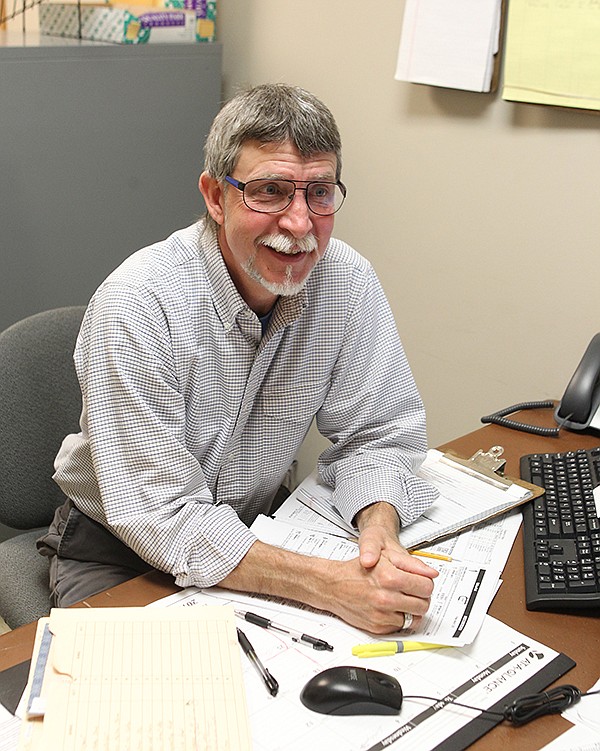EDITOR'S NOTE: A successful live race meet at Oaklawn Park depends on hundreds of employees working a variety of jobs, from making sure the horses are ready to run to ensuring that customers have a memorable day at the races. The Sentinel-Record today continues its weekly series spotlighting the workers who make Oaklawn a success.
For 20 years at Oaklawn Park, Walt Soes has been "flipping lips," ensuring that the right horses are in the right races and keeping the integrity of the industry a priority.
"It's a revolving door of paperwork, but it makes the day go by fast -- there's never a lull here in the office," Soes said, referencing the foal registration papers that he has to keep filed on every horse that enters Oaklawn. The papers include a horse's pedigree information, color, markings, cowlicks and an identification number issued by The Jockey Club that is supposed to be tattooed on the inside of the horse's upper lip.
"Where the test barn checks just a few horses each race and someone checks each horse that receives Lasix, I have to identify every horse that is racing on a given race day," Soes said. "Every horse that races at Oaklawn has to go through me."
Soes has been in the industry for many years, having trained and bred thoroughbreds at Louisiana Downs for 10 years and working for various tracks from Virginia to New Mexico and everywhere in between. His expertise and love of horses are what make him a knowledgeable and thorough identifier.
"I became a racing official in 1991 at Tampa Bay Downs and have been here, employed with Oaklawn Park, since 1995, and in 2012 I was a steward in Denver at Arapahoe Downs," he said. "You pretty much need to be a horseman to do what I do. Many horses don't want you messing with their lip, but those are the rules.
"I prefer to check them outside before they enter the paddock, because it's so confined. It's always the horse you aren't watching that will get you."
But it isn't just on race days that Soes is checking to make sure everything matches up with a horse and its paperwork.
"I do a lot of correspondence with the stewards, and I deal a lot in the transfer of horses to new trainers and owners," he said. "If I see on an entry's papers that they don't have a tattoo, they go on my list and I send my tattoo tech to take care of it.
"And the stewards now want me to check the gender of male horses, whether they are a colt or a gelding. If their papers say colt, but they come to the paddock as a gelding, that's a $100 fine. That can affect the tests at the test barn and, besides, the public needs to know that information."
Soes is employed by Oaklawn, though many states consider the identifier a state job. Many states, he said, require the identifier to bring the original paperwork to the paddock, but he said prefers having a printed sheet that shows which horses are entered in each race, highlighting all the pertinent information he looks for.
"At a glance, I can identify each horse and get everyone moving and where they need to be," he said. "Every day I hear from people that this job isn't all that important, but if we just let horses out there without checking, it would be bad news."
Though there is a lot riding on what Soes does, he said he wouldn't want to be doing anything else.
"It's kind of the best of both worlds," he said. "I've got an office job in the morning and spend all afternoon in the paddock.
"I think to stay in this business, you have to love the game, and here I get to be around some of the best horses in the country. I get to touch some pretty nice horses -- Zenyatta, Curlin -- who gets to say they've done that? If I had to stay in an office all day long, I don't think I could do it."
Local on 03/06/2015
